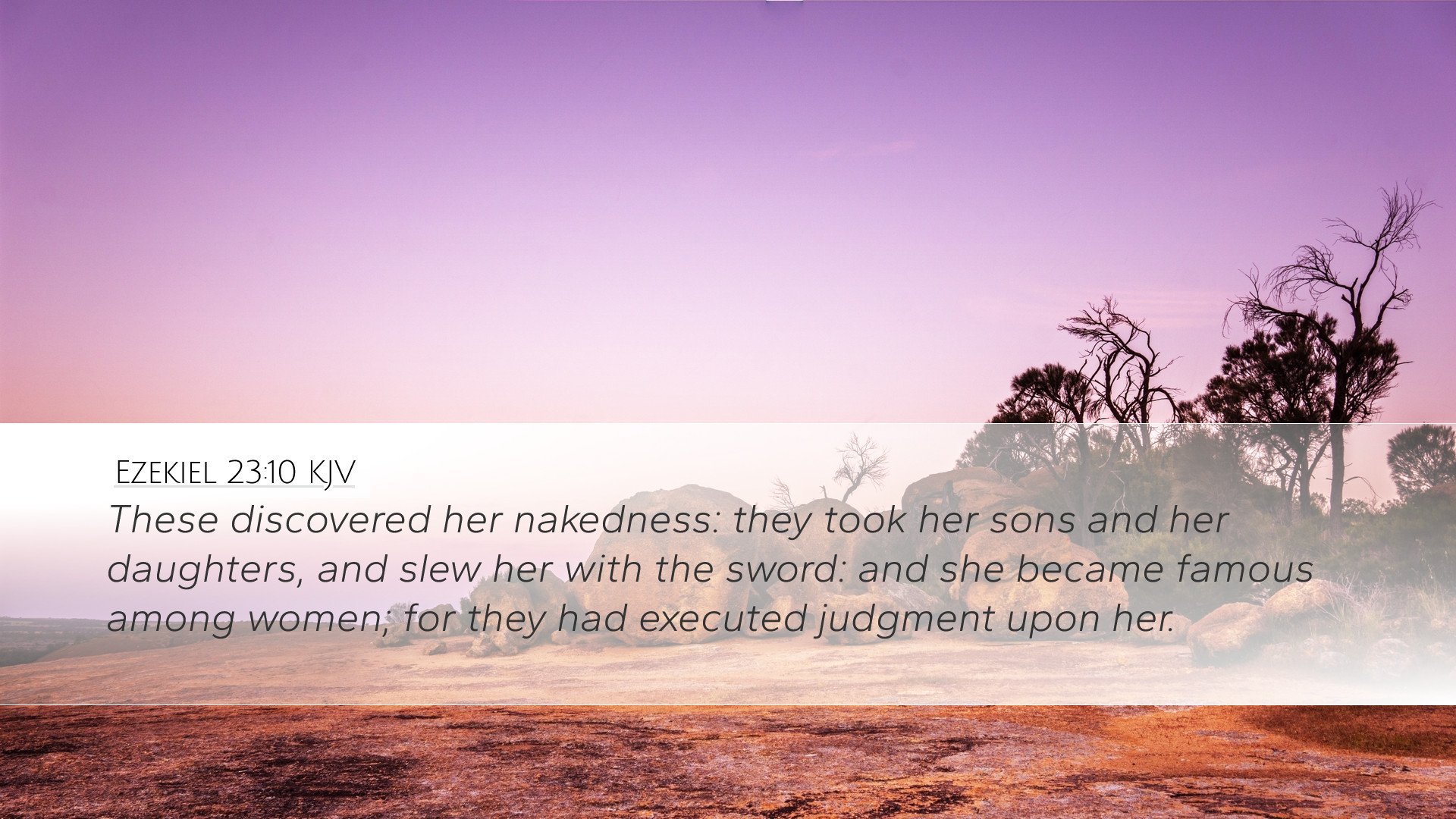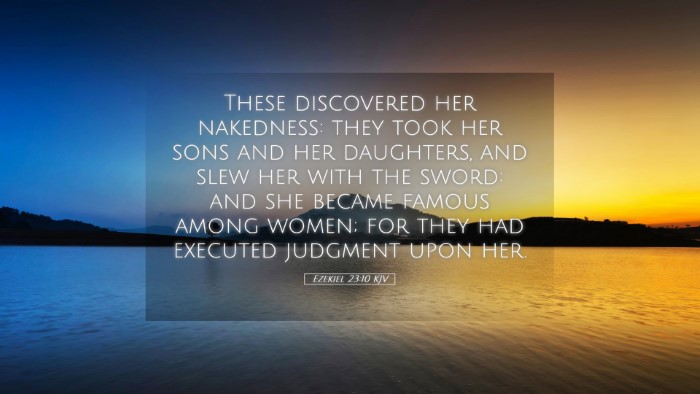Ezekiel 23:10 Commentary
Ezekiel 23:10 reads: "They discovered her nakedness; they took her sons and her daughters, and slew her with the sword: and she became famous among women; for they had executed judgment upon her." This verse encapsulates a strong metaphor regarding the fate of Judah and Israel as personified sisters, Oholah and Oholibah.
Contextual Background
This chapter in Ezekiel is a vivid and powerful illustration of the spiritual adultery of Israel and Judah, depicted as two sisters. Understanding the historical context is crucial for grasping the severity of the sins addressed in this passage.
- Historical Context: The background of the Babylonian exile plays a significant role in the messages delivered through Ezekiel. The people were turning away from Yahweh, seeking alliances with pagan nations rather than trusting in God's protection.
- Symbolism: Oholah represents the Northern Kingdom (Israel), while Oholibah signifies the Southern Kingdom (Judah). Their actions symbolize the unfaithfulness of the two nations.
Analysis of the Verse
The verse explicitly discusses the consequences of Israel and Judah's unfaithfulness to God, portraying their downfall as a direct result of their actions.
- Discovering Nakedness: This phrase symbolizes shame and vulnerability. In ancient Near Eastern culture, nakedness often represented moral and spiritual disgrace.
- Sons and Daughters Taken: The taking of children illustrates the devastating impact of sin, affecting not just the guilty party but future generations as well.
- Slew Her with the Sword: The violent imagery indicates divine judgment. This punishment is not merely physical but represents spiritual separation from God.
- Became Famous Among Women: The shame and destruction faced by Oholibah serves as a cautionary tale for the surrounding nations, highlighting the seriousness of turning away from God.
Theological Insights
Ezekiel’s message in this passage presents significant theological reflections:
- Divine Justice: God’s judgment is portrayed as inevitable when His people stray from their covenant relationship. This passage reminds readers that divine justice will prevail against unfaithfulness.
- The Nature of Sin: Sin is depicted not only as a personal failing but as communal and generational, affecting the entire nation and leading to catastrophic consequences.
- Hope for Restoration: While judgment is the primary theme here, the broader context of Ezekiel offers a glimpse of hope for restoration through repentance and returning to God.
Commentary Insights
Examining the insights from notable commentators provides a deeper understanding:
Matthew Henry
Matthew Henry emphasizes that this verse depicts the shame arising from moral failures. He interprets the actions taken against Oholah and Oholibah as a reflection of the judgment that comes when a nation forsakes God. Henry’s commentary reminds readers that unrepented sin leads not only to spiritual death but also national calamity.
Albert Barnes
Albert Barnes focuses on the consequences of Israel's harlotries, noting that the nations they sought alliances with ultimately turned against them. He highlights the significance of "nakedness" as a metaphor for exposure to judgment. Barnes argues that the severity of Oholibah's fate serves as a sobering warning to all nations who forsake the divine covenant.
Adam Clarke
In his commentary, Adam Clarke addresses the historical implications of the verse. He explores the metaphorical representation of sexual immorality through the actions of the sisters and underscores the spiritual implications of idolatry. Clarke emphasizes the lesson of vigilance and the importance of faithfulness to God amidst worldly temptations.
Practical Applications
For pastors, students, theologians, and Bible scholars, there are several practical applications to consider from Ezekiel 23:10:
- Teaching on Faithfulness: This passage provides a clear exhortation to remain faithful to God and His covenant.
- Understanding Consequences: The seriousness of sin requires attentive teaching on the consequences it can have, both personally and communally.
- Encouragement for Repentance: It compels the church today to embrace repentance, knowing that through it, restoration can occur.
- Awareness of Cultural Influence: Recognizing that cultural affiliations can lead believers away from God, resulting in spiritual nakedness is pivotal in current ministry.
Conclusion
Ezekiel 23:10 serves as a solemn reminder of the consequences of spiritual unfaithfulness and disobedience. The vivid imagery and powerful symbolism bring to light the seriousness of idolatry and the moral degradation that follows. The insights gleaned from public domain commentaries provide a comprehensive understanding, equipping pastors and theologians to teach and apply these timeless truths.


